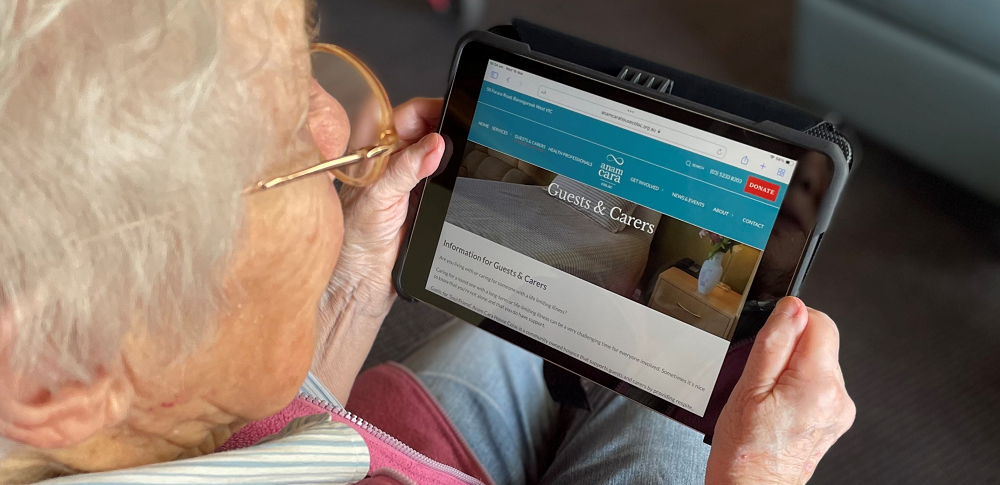The pandemic has added an extra layer of stress for people with life-limiting illnesses, but guests of a Colac hospice have been given a new way to connect with the world.
Anam Cara House Colac, a community-owned hospice providing respite, palliative care and end-of-life care, received $4500 from the Gardiner Dairy Foundation Community Grants Program in partnership with the Foundation for Rural & Regional Renewal to increase digital connectivity.
The funding was used to upgrade Wi-Fi and connect guest rooms, and buy three smart televisions and two hand-held digital devices.
Anam Cara House community liaison nurse Naomi Lettieri said the information technology upgrade had been more important than ever during the pandemic.
“It gave us better connectivity to the guest rooms and devices that meant we could connect people with their families and doctors from their rooms,” Ms Lettieri said.
“It has been a significant grant in that it allowed us to provide another layer of connectivity options for people, helping us to support them and open up the world around them a bit more in these socially isolated times.”
Ms Lettieri said the need for improved technology became more pronounced during COVID-19 with additional restrictions enforced at the hospice.
“The technology upgrade has been really timely and helpful given what we’re living through and how people are feeling isolated,” she said.
“COVID has added another layer for people who are immune compromised, generally unwell or short of breath. It’s an extra layer of stress so they can become more reclusive and more reluctant to go out or go to doctor’s appointments because they’re worried about catching COVID-19.”
Ms Lettieri said the grant had given guests more options, and, in some cases, introduced them to new technologies.
“It allowed us to cover spaces where there are no smart TVs or places where it’s more appropriate to have a touch-screen device,” she said.
“It meant that when it came to end of life, people still had access to their loved ones and they weren’t as isolated as they would be if they were in hospital,
“We had a lady with us over the last year who was able to have a conversation on a regular basis with her daughter who lives interstate. That has been comforting for both parties.”
The improved technology has been well received by guests, their families and their doctors and specialists.
“With the digital connectivity, if guests needed an appointment with their doctor or specialist while with us, we could connect them and their families could be present as well,” Ms Lettieri said.
“The doctors benefit because they can observe a lot more in a visual consultation. It’s helpful for everyone knowing they have that extra level of support if they need it.”
Anam Cara Colac – which derives its name from soul friend in Gaelic – recently celebrated its 10th anniversary and Ms Lettieri describes its success as an inspirational story of how a rural community can band together and support one another.
“Studies show 70 per cent of people want to die at home but only 14 per cent achieve that,” she said. “We aim to help people achieve their goals by providing support for those who have been recently diagnosed or are in the end stages of their life-limiting illness.”
“Our guests are in control; they tell us what they want. It’s all about flexibility and giving people options on how they receive their care, which is empowering and very respectful for the person.”
Now in its 20th year, the Gardiner Dairy Foundation Community Grants Program is delivered by the Foundation for Rural & Regional Renewal (FRRR). Grants of up to $5,000 will help not-for-profit organisations in small Victorian dairy communities deliver projects that will benefit local people and strengthen their ability to deal with local issues and enhance existing community infrastructure.
Applications for the 2022 program are now open and close April 14 and can be found at https://www.gardinerfoundation.com.au/communitygrants/

